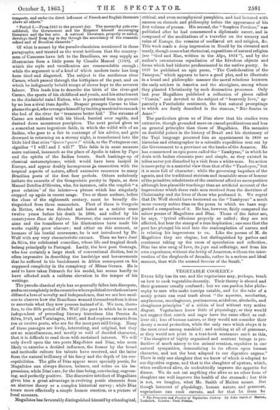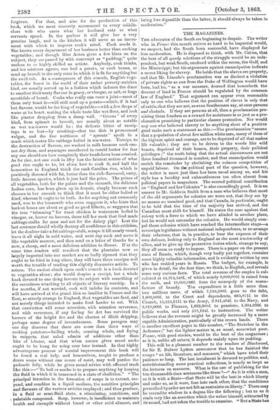VEGETABLE COOKERY.*
EVERY folly has its use, and the vegetarians may, perhaps, teach us how to cook vegetables decently. Their theory is absurd and their grammar usually confused ; but we can pardon false philo- sophy to men who make turnips eatable, and for the sake of a mealy potato can read trash about "the aqueous, saccharine, amylaceous, mucilaginous, pectinaceous, acidulous, alcoholic, and oleaginous principles" of a sirloin of beef without very active disgust. Vegetarians know little of physiology, or they would not suggest that starch and sugar have the same effect as cod- liver oil ; less of human nature, or they would not consider their theory a moral protection, while the only race which obeys it is the most cruel among mankind ; and nothing at all of grammar, or they would not print in a text-book sentences sue it as this, "The slaughter of highly organized and sentient beings is pro- ductive of much misery to the animal creation, repulsive to our natural sympathies, demoralizing in its effects upon human character, and not the best adapted to our digestive organs." There is only one slaughter that we know of which is adapted to our digestive organs, and that is the slaughter of oysters, which, when swallowed alive, do undoubtedly improve the appetite for dinner. We do not eat anything else alive so no other form of slaughter can well improve the health of the stomach ; but this is not, we imagine, what Mr. Smith of Melton meant. But though innocent of physiology, human nature, and grammar, vegetarians can cook carrots, and for that let them be * The Principles and Prodiee of Vegetarian Cookery. By John Smith of Milton. Yorkshire. London ; Fred. Pitreau.
forgiven. For that, and also for the production of this book, which we most sincerely recommend to every middle- class wife who cares what her husband eats or what servants spend. In the parlour it will give her a very genuine laugh, and in the kitchen it will serve as an instru- ment with which to impress cook's mind. Cook needs it. She knows every department of her business better than cooking vegetables ; and though Miss Acton gives a few hints on the subject, they are passed by with contempt as "padding," quite useless to so highly skilled an artiste. Anybody, cook thinks, and her mistress agrees, can boil a potato, or cook beans, or send up brocoli in the only state in which it is fit for anything but the swill-tub. As a consequence of this conceit, English vege- tables, the finest in the world of their rather poverty-stricken kind, are usually served up in a fashion which induces the diner to smother their nasty flavour in gravy, or vinegar, or salt, or huge mouthfuls of bread. Cooks who really can roast a joint—most of them only toast it—will still send up a potato—which, if it had but flavour, would be the king of vegetables—with a few drops of water at its heart, making the whole taste like wet flour, and look like plaster dropping from a damp wall. " Greens " of every kind, from spinach to brocoli, are usually about as eatable as wet tea-leaves would be ; the delicate bitter of turnip- tops is so lost—by crushing—that the dish is pronounced vulgar, and the fine nuttiness of " sprouts" spoilt in a mash which tastes like cabbage boiled in sea-water. Turnips, to the destruction of flavour, are washed in milk because cook can- not dry them, and asparagus smothered in rancid butter for fear any one should see how completely their heads have been crushed. As for rice, not one cook in fifty has the faintest notion of what good rice ought to be, let alone how to cook it, and half the housewives in England think the rank Carolina rice, which is positively diseased with fat, better than the rich-flavoured, nutty, little Aracan species, which is just half the price. The prince of all vegetables, both for the palate and the stomach, the delicious Indian corn, has been given up in despair, simply because cook chooses in her conceit to think that it must be either boiled or fried, whereas it ought to be both. As for anything not commonly used, woe to the housewife who even suggests it, who hints that haricot beans are about as good as good filberts, or suggests that the true "trimming " for roast chicken is watercress boiled in vinegar, or, horror on horrors, dares tell her cook that God made cabbage-stalks for men and not for the dainty pigs! Lest the last sentence should wholly destroy all confidence in this criticism, let the doubter take a fat cabbage-stalk, scrape it till nearly round, leave it all night in cold water, and next day cook and serve it like vegetable marrow, and then send us a letter of thanks for a new, a cheap, and a most delicious addition to dinner. If at the same time readers will recollect that the plantains now so largely imported into our market are so badly ripened that they ought to be fried in long slices, they will have three receipts well worth the trouble of reading this slightly discursive article. To return. The easiest check upon cook's conceit is a book devoted to vegetables alone ; she would despise a receipt, but a whole book devoted to one thing invests its subject with something of the sacredness attaching to all objects of literary worship. In a few months, if not worried, cook will imbibe its contents, and will have arrived at the grand idea so familiar in France and the East, so utterly strange in England, that vegetables are food, and not merely things intended to make food harder to eat. With that conviction will come attention, with attention reverence, and with reverence, if any feeling for Art has survived the horrors of the blight fire and the charms of illicit dripping, perhaps some degree cf inventiveness. Some paragon may one day discover that there are more than three ways of cooking potatoes—boiling whole, toasting whole, and frying in snippets, that salad admits of additions other than bits of lobster, and that when nature gives sorrel cooks ought to be bung for using sour beer instead. In that highly advantageous process of mental improvement this book will be found a real help, and housewives, taught to produce a dozen soups without one ounce of meat, may well pardon the pedantic folly, while he gives sound advice with affected trash like this :—" To boil or seethe is to prepare anything by keeping the fluid in which it is immersed in a state of ebullition." "The principal intention in the formation of soups is to extract, sus- pend, and combine in a liquid medium, the nutritive principles and flavours of the various articles employed ; and thus produce, in a fluid or semi-fluid state, a stimulating, nutritious, and palatable compound. Soup, however, is insufficient to maintain health and strength. without bread ' or other solid aliment, and being less digestible than the latter, it should always be taken in moderation."































 Previous page
Previous page